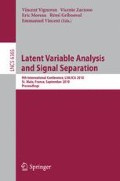Abstract
In this paper, we firstly propose an adaptive method based on the idea of Least Mean Square (LMS) algorithm and the concept of smoothed l 0 (SL0) norm presented in [1] for estimation of sparse Inter Symbol Interface (ISI) channels which will appear in wireless and acoustic underwater transmissions. Afterwards, a new non-adaptive fast channel estimation method based on SL0 sparse signal representation is proposed. ISI channel estimation will have a direct effect on the performance of the ISI equalizer at the receiver. So, in this paper we investigate this effect in the case of optimal Maximum Likelihood Sequence-by-sequence Equalizer (MLSE) [2]. In order to implement this equalizer, we propose a new method called pre-filtered Parallel Viterbi Algorithm (or pre-filtered PVA) for general ISI sparse channels which has much less complexity than ordinary Viterbi Algorithm (VA) and also with no considerable loss of optimality, which we have examined by doing some experiments. Indeed, Simulation results clearly show that the proposed concatenated estimation-equalization methods have much better performance than the usual equalization methods such as Linear Mean Square Equalization (LMSE) for ISI sparse channels, while preserving simplicity at the receiver with the use of PVA.
Access this chapter
Tax calculation will be finalised at checkout
Purchases are for personal use only
Preview
Unable to display preview. Download preview PDF.
References
Mohimani, H., Babaie-Zadeh, M., Jutten, C.: A fast approach for overcomplete sparse decomposition based on smoothed l 0-norm. IEEE Trans. Signal Processing 57(1), 289–301 (2009)
Proakis, J.: Digital Communication, 4th edn. Mc-Graw Hill, New york (2001)
Carbonelli, C., Vedantam, S., Mitra, U.: Sparse channel estimation with zero tap detection. IEEE Trans. Communication 6(5), 1743–11754 (2007)
Cotter, S., Rao, B.: Sparse channel estimation via matching pursuit with application to equalization. IEEE Trans. Communication 50(3), 374–378 (2002)
Li, W., Vedantam, S., Preisig, J.: Estimation of rapidly time-varying sparse channels. IEEE Journal of Oceanic Engineering 32(4), 927–940 (2007)
Chen, Y., Gu, Y., Hero III, A.O.: Sparse LMS for system identification. In: ICASSP, pp. 3125–3128 (2009)
Mcginty, N.C., Kennedy, R., Hoeher, P.: Parallel trellis viterbi algorithm for sparse channels. IEEE Communication Letters 2(5), 143–145 (1998)
Widrow, B., Streams, S.: Adaptive Signal Processing. Prentice-Hall, New Jersey (1985)
Mietzner, J., Hoeher, S., Land, I., Hoeher, P.: Trellis-based equalization for sparse ISI channels revisited, ISIT, 229–233 (2005)
Chen, S., Donoho, D., Saunders, M.: Atomic decomposition by basis pursuit. SIAM review 43(1), 129–159 (2001)
Tibshirani, R.: Regression shrinkage and selection via the lasso. Journal of the Royal Statistical Society. Series B (Methodological) 58(1), 267–288 (1996)
Eftekhari, A., Babaie-Zadeh, M., Jutten, C., Moghaddam, H.: Robust-SL0 for stable sparse representation in noisy settings. In: ICASSP 2009, pp. 3433–3436 (2009)
Author information
Authors and Affiliations
Editor information
Editors and Affiliations
Rights and permissions
Copyright information
© 2010 Springer-Verlag Berlin Heidelberg
About this paper
Cite this paper
Niazadeh, R., Hamidi Ghalehjegh, S., Babaie-Zadeh, M., Jutten, C. (2010). Adaptive and Non-adaptive ISI Sparse Channel Estimation Based on SL0 and Its Application in ML Sequence-by-Sequence Equalization. In: Vigneron, V., Zarzoso, V., Moreau, E., Gribonval, R., Vincent, E. (eds) Latent Variable Analysis and Signal Separation. LVA/ICA 2010. Lecture Notes in Computer Science, vol 6365. Springer, Berlin, Heidelberg. https://doi.org/10.1007/978-3-642-15995-4_72
Download citation
DOI: https://doi.org/10.1007/978-3-642-15995-4_72
Publisher Name: Springer, Berlin, Heidelberg
Print ISBN: 978-3-642-15994-7
Online ISBN: 978-3-642-15995-4
eBook Packages: Computer ScienceComputer Science (R0)

